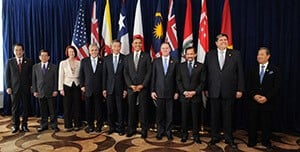 The United States and 11 Pacific Rim nations on Monday reached a final agreement on the largest regional trade agreement in history, the Trans-Pacific Partnership.
The United States and 11 Pacific Rim nations on Monday reached a final agreement on the largest regional trade agreement in history, the Trans-Pacific Partnership.
And getting Congress' approval for the deal could be President Barack Obama's toughest fight in his final year in the White House.
Those opposed to the deal say it expands corporate rights across member states to the disadvantage of workers' rights, the environment, and public health.
Among notable opponents are two key 2016 presidential hopefuls: Republican candidate Donald Trump and Democratic candidate Bernie Sanders.
Here's why Donald Trump and Bernie Sanders hate the Trans-Pacific Partnership.
Why Both Bernie Sanders and Donald Trump Hate the Trans-Pacific Partnership
Democratic candidate Senator Bernie Sanders (I-VT) has long opposed the Trans-Pacific Partnership. In a statement Monday, Sanders said he was "disappointed but not surprised by the decision to move forward on the disastrous Trans-Pacific Partnership trade agreement that will hurt consumers and cost American jobs."
"Wall Street and other big companies have won again," Sanders said. "It is time for the rest of us to stop letting multinational corporations rig the system to pad their profits at our expense."
Sanders said he will do all he can to defeat the TPP. Shortly after the deal's announcement, Sanders launched a fund-raising appeal to prevent the deal from becoming law.
[mmpazkzone name="in-story" network="9794" site="307044" id="137008" type="4"]
Meanwhile, Republican candidate Donald Trump has called the Trans-Pacific Partnership a "terrible deal."
Trump said the agreement would cost Americans jobs and benefit foreign countries and big corporations. In a Twitter message Tuesday, Trump wrote, "The incompetence of our current administration is beyond comprehension. TPP is a terrible deal."
As the current GOP front-runner, Trump's stance on the Trans-Pacific Partnership could put serious pressure on the Republican-controlled House and Senate to not approve it.
It's not yet known when President Obama will notify Congress that he intends to sign the accord. But when he does, Congress has 90 days to consider it. Additional time is expected, according to congressional and administration officials.
Congress does have the power to accept or reject the agreement. Here's why that will be such an important decision...
A Closer Look at the Trans-Pacific Partnership
The Office of the U.S. Trade Representative touts the Trans-Pacific Partnership as a balanced agreement that will promote economic growth, enhance innovation, and create jobs.
The government agency aims to eventually end more than 18,000 tariffs that participating countries have placed on American exports. These exports include autos, machinery, information technology, consumer goods, chemicals, and a wide range of agriculture products.
The 11 Pacific Rim countries involved in the deal are Australia, Brunei Darussalam, Canada, Chile, Japan, Malaysia, Mexico, New Zealand, Peru, Singapore, and Vietnam. The collective group accounts for some 40% of global trade.
However, labor unions remain steadfast opponents.
The agreement, opponents say, would have American workers competing against laborers from emerging and frontier markets where the minimum wage can be a little as $2.75 a day.
"It threatens to roll back financial regulation, environmental standards and U.S. laws that protect the safety of drugs we take, food we eat and toys we give our children," Democratic Reps. George Miller of California, Rosa DeLauro of Connecticut, and Louise Slaughter of New York wrote in an April 2014 LA Times op-ed.
Stay informed on what's going on in the markets by following us on Twitter @moneymorning.
Related Articles:
- CNN Money: Why Everyone Hates Obama's Signature Trade Deal
- Office of the U.S. Trade Representative: Summary of the Trans-Pacific Partnership Agreement
- The Wall Street Journal: Trans-Pacific Partnership Trade Deal Throws Presidential Candidates a Curveball


